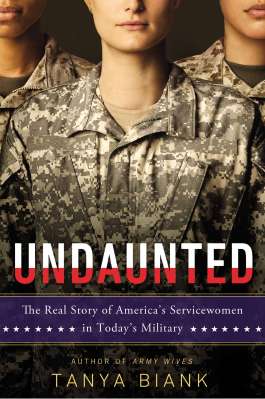A female soldier trains with the Army's 101st Airborne Division at Fort Campbell, Ky., last year.
Talk about timing!
Two weeks after Defense Secretary Leon Panetta opens combat positions to women, Tanya Biank is publishing Undaunted: The Real Story of America’s Servicewomen in Today’s Military. The daughter, sister and wife of Army colonels, Biank also wrote Army Wives, the basis for the Lifetime series by the same name.
In her new book, Biank writes of the challenges military women face in their quest to join the ultimate old-boys’ network, and the pressures they face when it comes to marriage and motherhood. Battleland conducted this email chat with Biank last week:
What is the bottom line in your new book, Undaunted: The Real Story of America’s Servicewomen in Today’s Military?
Women can be as tough as men. Courage and commitment have no gender.
What is the biggest misperception people have about women in uniform?
That they will crumble under the pressures of combat. Over the last 10 years servicewomen have proven their worth in the worst of circumstances, and that’s one of the reasons the combat ban’s been lifted.
To what degree do women have to be better than men to thrive in today’s U.S. military?
I don’t know that they have to be better than men, although many successful servicewomen feel they have to exceed standards.
Women who do thrive in the military are known as being “sharp” which pertains to their overall performance, to include physical fitness, leadership, military bearing and ability to accomplish tasks.
How will the Pentagon’s recent decision to let women serve in combat change things?
We won’t know the full extent until the services provide their implementation plans to the Department of Defense in May. But the decision certainly increases opportunities for women and changes the all-male culture of the combat arms branches.
What was the most surprising thing you learned while writing this book?
Women are harder on other women than they are on men. Squared-away servicewomen are bothered greatly by women who are weak performers or who have “deficiencies.”
Seasoned servicewomen tend to be mentors to younger women, but depending on the branch they’re in, there aren’t always enough of them to go around.
Is there a “best” service for a woman to serve in? A “worst”? Why?
It really comes down to personal choice.
Each service has a unique culture and mission, so a woman can choose a service to best fit her personality, goals or desired image of what she wants to be. For some it may be a function of following a family tradition or following in the footsteps of a mentor or role model.
How big of a problem is sex in the ranks?
It becomes a problem when it occurs within the same chain of command. Why? Because a perception of favoritism could occur, or worse, if the relationship turns bad, it adversely affects the morale of the unit and could interfere with unit cohesion and performance in combat.
There’s an expectation that military members act professionally and responsibly at all times in a war zone and that their personal behavior shouldn’t jeopardize mission readiness.
If a servicewoman has to leave the theater because she’s pregnant, this leaves a capability gap which someone, or the unit, now has to compensate for. This is a readiness issue and an example of how the irresponsible actions of two people can impact an entire unit.
As women receive increased opportunities in combat arms units, do you think the nature of warfare will change?
No, the nature of warfare will not change. Our military doctrine is gender-neutral. The military isn’t going to change how it fights because of the gender make-up of our forces.




